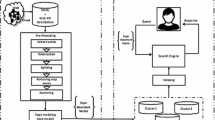Abstract
Contemplating the enormous success of the Web and the reluctance in taking up the web service technology, the idea of a service engine enabled service-oriented architecture seems to be more and more plausible than the traditional registry based one. Automatically clustering WSDL files on the Web into functional similar homogenous service groups can be seen as a bootstrapping step for creating a service search engine and at the same time reduce the search space for service discovery. This paper devises techniques to automatically gather, discover, and integrate features related to a set of WSDL files, and cluster them into naturally occurring groups.
Preview
Unable to display preview. Download preview PDF.
Similar content being viewed by others
References
Peltz, C.: Web services orchestration - a review of emerging technologies, tools and standards. Technical report, Hewlett Packard, Co. (2003)
Garofalakis, J., Panagis, Y., Sakkopoulos, E., Tsakalidis, A.: Web service discovery mechanisms: Looking for a needle in a haystack? In: International Workshop on Web Engineering, Hypermedia Development and Web Engineering Principles and Techniques: Put them in use, in conjunction with ACM Hypertext, Santa Cruz (2004)
Liu, W.: Trustworthy service selection and composition - reducing the entropy of service-oriented web. In: 3rd International IEEE Conference on Industrial Informatics, Perth, Australia (2005)
Booth, D., Haas, H., McCabe, F., Newcomer, E.M.C., Ferris, C., Orchard, D.: Web services architecture. Technical report, W3C WG Note (2004), http://www.w3.org/TR/ws-arch/
Garofalakis, J., Panagis, Y., Sakkopoulos, E., Tsakalidis, A.: Contemporary web service discovery mechanisms. Journal of Web Engineering 5(3), 265–290 (2006)
Klusch, M., Fries, B., Sycara, K.: Automated semantic web service discovery with owls-mx. In: Proceedings of the fifth international joint conference on Autonomous agents and multiagent systems, Hakodate, Japan, pp. 915–922 (2006)
Sajjanhar, A., Hou, J., Zhang, Y.: Algorithm for web service matching. In: Yu, J.X., Lin, X., Lu, H., Zhang, Y. (eds.) APWeb 2004. LNCS, vol. 3007, pp. 665–670. Springer, Heidelberg (2004)
Berry, M.W., Dumais, S.T., O’Brien, G.W.: Using linear algebra for intelligent information retrieval. SIAM Review 37(4), 573–595 (1995)
Li, Y., Liu, Y., Zhang, L., Li, G., Xie, B., Sun, J.: An exploratory study of web services on the internet. In: 2007 IEEE International Conference on Web Services (ICWS) (2007)
Manning, C., Schutze, H.: Foundations of statistical natural language processing. MIT Press, Cambridge (1999)
Church, K., Gale, W.: Inverse document frequency (idf): A measure of deviations from poisson. In: Proceedings of the ACL 3rd Workshop on Very Large Corpora (1995)
Wong, W., Liu, W., Bennamoun, M.: Tree-traversing ant algorithm for term clustering based on featureless similarities. Journal on Data Mining and Knowledge Discovery 15(3), 349–381 (2007)
Liu, W., Weichselbraun, A., Scharl, A., Chang, E.: Semi-automatic ontology extension using spreading activation. Journal of Universal Knowledge Management (1), 50–58 (2005)
Cilibrasi, R., Vitanyi, P.: The google similarity distance. IEEE Transactions on Knowledge and Data Engineering 19(3), 370–383 (2007)
Mandelbrot, B.: Information theory and psycholinguistics: A theory of word frequencies. MIT Press, MA (1967)
Author information
Authors and Affiliations
Editor information
Rights and permissions
Copyright information
© 2008 Springer-Verlag Berlin Heidelberg
About this paper
Cite this paper
Liu, W., Wong, W. (2008). Discovering Homogenous Service Communities through Web Service Clustering. In: Kowalczyk, R., Huhns, M., Klusch, M., Maamar, Z., Vo, Q.B. (eds) Service-Oriented Computing: Agents, Semantics, and Engineering. SOCASE 2008. Lecture Notes in Computer Science, vol 5006. Springer, Berlin, Heidelberg. https://doi.org/10.1007/978-3-540-79968-9_6
Download citation
DOI: https://doi.org/10.1007/978-3-540-79968-9_6
Publisher Name: Springer, Berlin, Heidelberg
Print ISBN: 978-3-540-79967-2
Online ISBN: 978-3-540-79968-9
eBook Packages: Computer ScienceComputer Science (R0)




